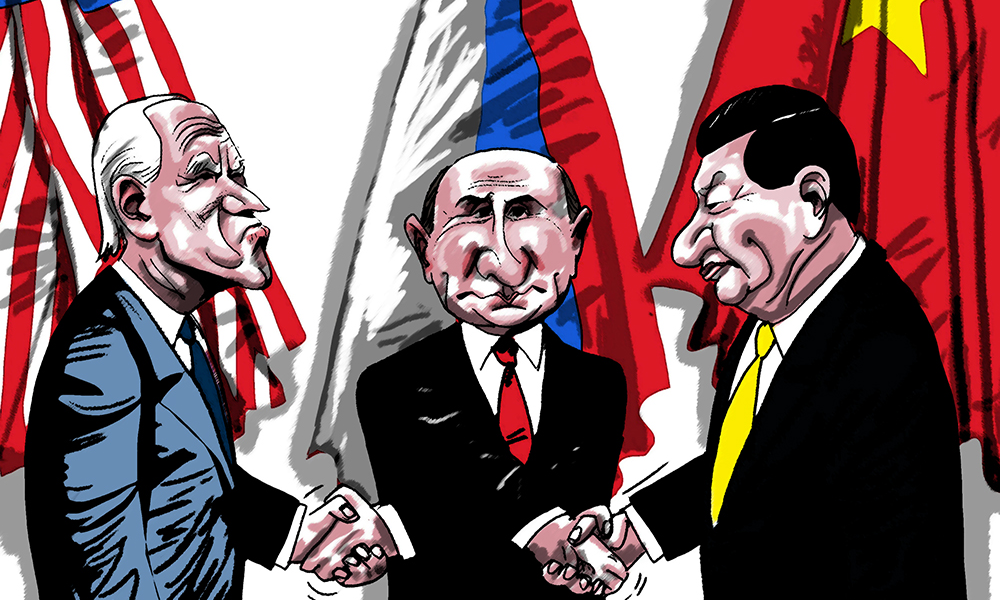The mountainous land in the heart of Asia known as Afghanistan has always remained a major geo-political dispute among the superpowers. The great game (Tsar Russia vs Britain), Cold-War (USSR/Russia vs America) and war on global terrorism gained attention of these giant-fish to fight for supremacy, domination and securing their strategic depth in this piece of land. But on the other hand, the host nation (Afghanistan) escaped from above-mentioned disputes with one self-salvage neck-name “the graveyard of empires”.
Out of the above three scenarios, the best one goes back to the late 2001 when the United States along with its NATO-partners swept up the Taliban and Al-Qaeda fighters within a short span of time. The initial phase of the US and its partners’ presence was not seen as a security threat by its two major rivals such as Russia and China, because the US got the license from the United Nations Security Council (UNSC)[1]. The removal of the Taliban from power was considered the key turning point into the modern history of Afghanistan.
The contest of trio superpowers on securing their influence in Afghanistan
Following the expeditious withdrawal of the US and its partners from Afghanistan on 31th August 2021, a new version of blank space was created. China and Russia were cautiously tracking the vacuum in Afghanistan, because both of them had their diplomatic missions running active while other foreign diplomatic offices had shut their doors in Afghanistan.
China, one of the most powerful countries in the world in terms of formidable economy and massive military status, already made an impression on the Taliban. In addition to that, the cornerstone relationship of Pakistan with the Taliban has put further value on diplomatic ties with China and the Taliban. China, as an emerging superpower country in Asia, always pursues its so-called economic domination by investing in other countries. Indeed, China wants to expand its influence in Afghanistan through its non-interference approach. But in reality China is eyeing Afghan’s mines and suppressing the Uyghori minorities[4] who have been given shelter in Afghanistan.
On the other hand, Russia is looking for a durable, trustful and sustainable relationship[5] with the current regime of Kabul. However, the war on Ukraine and the mild activities of ISK-P in some of the northern provinces of Afghanistan has kept Russia in a think-tank room. Russia perceives that probably its arch-rival (the US) is planning to trap it either in Afghanistan or Ukraine. On the other hand, the weekly sending of dollars by the US to Kabul and secret meetings of the US and the Taliban officials behind the closed doors in Doha[6], have kept the other dots of the triangle (China and Russia) in back-seats of the game.
To close up this piece of opinion paper, the continuation of triangle game over the maintaining of influence could further divide the current regime of the Taliban into smaller groups where each might work in a favor of any of the triangle superpowers. However, the geo-location of Afghanistan will remain a contested space for an unspecific juncture of time.
[1]United Nations Security Council Resolution 1386 – Wikipedia
[2]How Much Us Spent in Afghanistan – Search,” Bing, accessed October 16, 2022
[3]The Washington Post, last modified April 13, 2021
[4]Chinese mining groups scour Afghanistan for opportunities | Financial Times (ft.com)
[5]Russia says Kabul seems safer under Taliban than it was under Ghani – EURACTIV.com
[6]Top US officials hold first in-person meeting with the Taliban since the US killed al Qaeda’s leader in July | CNN Politics
Ahmad Marzee is a graduate of Kardan University in Afghanistan and Command and Staff College of the United States. He is currently pursuing his Master’s at the department of War Studies in Kings College of London, UK.


